Search Results
Showing results 1 to 20 of 80
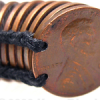
Penny Rubbing
Source Institutions
In this art-related activity, learners make a coin rubbing—a process similar to what archeologists may do with ancient artifacts. This activity can be used in connection with a history or art lesson.
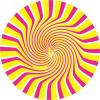
Spinning Blackboard
Source Institutions
Create beautiful spirals by drawing a straight line. This sounds crazy, but you can with a turntable (a record player or lazy susan), paper, and pen.
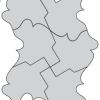
Exploring Tessellations (Grades 6-8)
Source Institutions
In this activity, learners design unique tiles and make repeating patterns to create tessellations. This activity combines the creativity of an art project with the challenge of solving a puzzle.
One-Cut Paper Stars
Source Institutions
Here's a very simple activity if you have paper and scissors: make one cut, unfold, and you have a beautiful star! A great way to learn about polygons and origami mathematics.
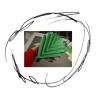
Paper Folding: Unfurling Geometric Paper Shapes
Source Institutions
Use geometry, a ruler, and a steady hand to create these amazing unfurling paper folds!
Counting Books: Make Your Own!
Source Institutions
On the first night, I saw 5 stars in the desert. On the second night, I saw 10… What do you think I saw on the third night? Combine arts and crafts, literacy, and math by making a counting book.
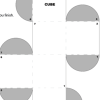
Fold a Crystal
Source Institutions
Rocks are made of minerals, and minerals often have crystal shapes. In this fun activity about geometry in nature, learners create their own crystal shapes out of paper.
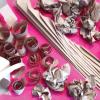
Paper Sculptures
Source Institutions
In this activity, learners manipulate paper to build original 3-dimensional sculptures. Appropriate for any age, learners can use fingers to tear, crumple, or fold, and if available, scissors to cut.
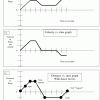
Graph Dance
Source Institutions
In this activity, learners "dance" (move back and forth at varying speeds) by reading a graph. This is a kinesthetic way to help learners interpret and understand how motion is graphed.
Movin' and Groovin'
Source Institutions
In this math activity, learners play a game and identify patterns with fun moves and sounds. Discover how dancing and signing involve patterns.
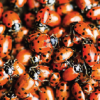
Ladybug Spots
Source Institutions
In this art/science/math activity, young learners are introduced to the concept of symmetry in nature.
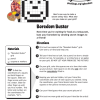
Boredom Buster
Source Institutions
In this Cyberchase activity, use grid coordinates to share secret pictures with a friend. Color squares of a grid to make a picture (like a smiley face) that you keep hidden from the other person.
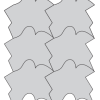
Making a Translation Tessellation
Source Institutions
In this activity, learners slide shapes to create unusual tiled patterns.
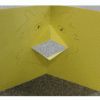
Simple Pop-Up Mechanisms
Source Institutions
In this activity, learners construct three quick and simple mechanisms to start building a pop-up book. Learners fold, cut, and glue paper to make a bird beak, parallelogram, and V-fold.

Size It Up
Source Institutions
In this artistic activity, learners blow up a smaller picture into a larger one, by using a grid.
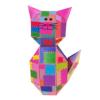
Patches the Cat: A Print-and-Build Paper Sculpture Kit
Source Institutions
In this activity, learners get hands-on with geometry by making a polyhedron kitty sculpture.
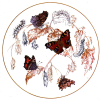
Butterfly Symmetry Painting
Source Institutions
This activity (on page 3 of the PDF) has learners create models of butterfly wings.
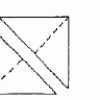
Making Tangram Pieces by Folding Paper
Source Institutions
In this math lesson, learners follow step-by-step directions for making tangram pieces out of folded and torn paper. First, learners read "Grandfather Tang's Story" by Ann Tompert.
Six Squares: Geometry and Design
Source Institutions
In this activity, learners take a turn contributing a closed figure made of six squares to a large grid; each must be different from all the others on the grid so far.
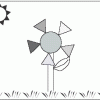
Bloomin' Bud Glyph
Source Institutions
In this math lesson, learners practice reading charts and graphs by creating and interpreting glyphs.
